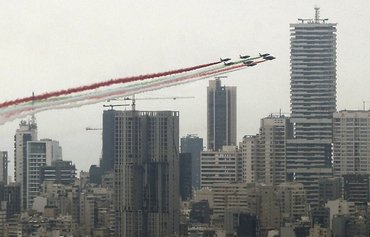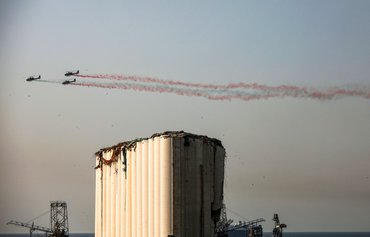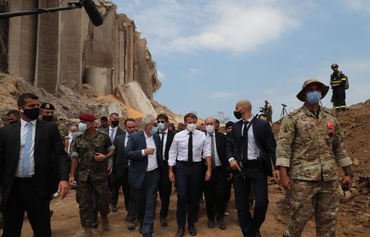World leaders on Sunday (August 9th) pledged more than 250 million euros ($298 million) for Lebanon, conference host France said, with emergency aid to be delivered "directly" to a population reeling from the deadly blast in Beirut.
The devastating August 4th explosion of a huge stockpile of ammonium nitrate killed more than 150 people, wounded some 6,000 and left an estimated 300,000 homeless in a country already facing a health and economic crisis.
Fifteen government leaders, including US President Donald Trump, took part in the virtual conference hosted by French President Emmanuel Macron and the UN, pledging solidarity with the Lebanese people.
They promised to muster "major resources" in the coming days and weeks.
A joint statement issued after the meeting, in which representatives of nearly 30 countries as well as the EU and Arab League participated, did not mention a global amount.
But Macron's office said the total figure of "emergency aid pledged or that can be mobilised quickly" amounts to 252.7 million euros.
'Utmost efficiency and transparency'
The joint statement underscored concerns about Lebanese government corruption.
"The participants agreed that their assistance should be timely, sufficient and consistent with the needs of the Lebanese people, well-coordinated under the leadership of the UN, and directly delivered to the Lebanese population, with utmost efficiency and transparency," it said.
USAID acting administrator John Barsa also said in a conference call Sunday that US help, some $15 million announced so far, "is absolutely not going to the government".
The donor nations urged Lebanon's authorities to "fully commit themselves to timely measures and reforms" in order to unlock longer-term support for the country's economic and financial recovery.
And they said assistance for "an impartial, credible and independent inquiry" into Tuesday's explosion "is immediately needed and available, upon request of Lebanon".
The UN said some $117 million will be needed over the next three months for health services, emergency shelter, food distribution and programmes to prevent further spread of COVID-19, among other interventions.
Macron said it was now up to the authorities of Lebanon "to act so that the country does not sink, and to respond to the aspirations that the Lebanese people are expressing right now, legitimately, in the streets of Beirut".
"We must all work together to ensure that neither violence nor chaos prevails," he added. "It is the future of Lebanon that is at stake."
Trump also called for calm, saying he agreed with other leaders on the group call to "work closely together in international response efforts".
He "also urged the government of Lebanon to conduct a full and transparent investigation, in which the US stands ready to assist", the White House said.
Thousands in need of food
Also attending Sunday's conference was UN aid co-ordinator Mark Lowcock, representatives of the World Bank, the Red Cross, the IMF, the European Investment Bank and the European Bank for Reconstruction and Development.
Gulf states, including Saudi Arabia, Qatar, Iraq and the UAE were represented, as were Britain, China, Jordan and Egypt.
Macron said Turkey and Russia had indicated their support for the initiative, though they did not take part in the conference.
According to the UN, at least 15 medical facilities, including three major hospitals, sustained structural damage in the blast, and extensive damage to more than 120 schools may interrupt learning for some 55,000 children.
Thousands of people are in need of food and the blast interrupted basic water and sanitation to many neighbourhoods.
France has been sending tonnes of medical and food aid, dozens of search and rescue personnel and forensic experts to aid the investigation, as well as reconstruction materials.
On top of cash aid pledged so far, Egypt and Qatar have promised field hospitals, Brazil said it would send 4,000 tonnes of rice, and Spain 10 tonnes of wheat.
"In these horrendous times, Lebanon is not alone," concluded the conference statement.

![Volunteers, clad in masks due to the coronavirus pandemic, distribute meals to people affected by the Beirut port explosion in the city's Ashrafieh neighbourhood on Monday (August 10th). [Anwar Amro/AFP]](/cnmi_am/images/2020/08/10/25400-Lebanon-volunteer-meals-600_384.jpg)






